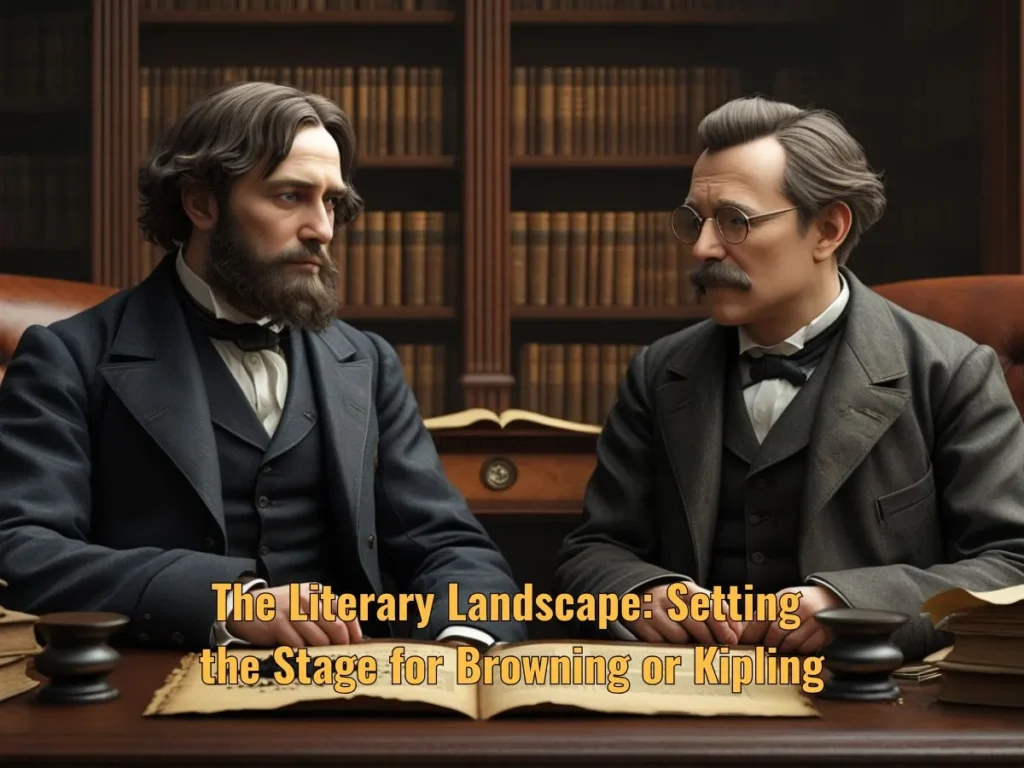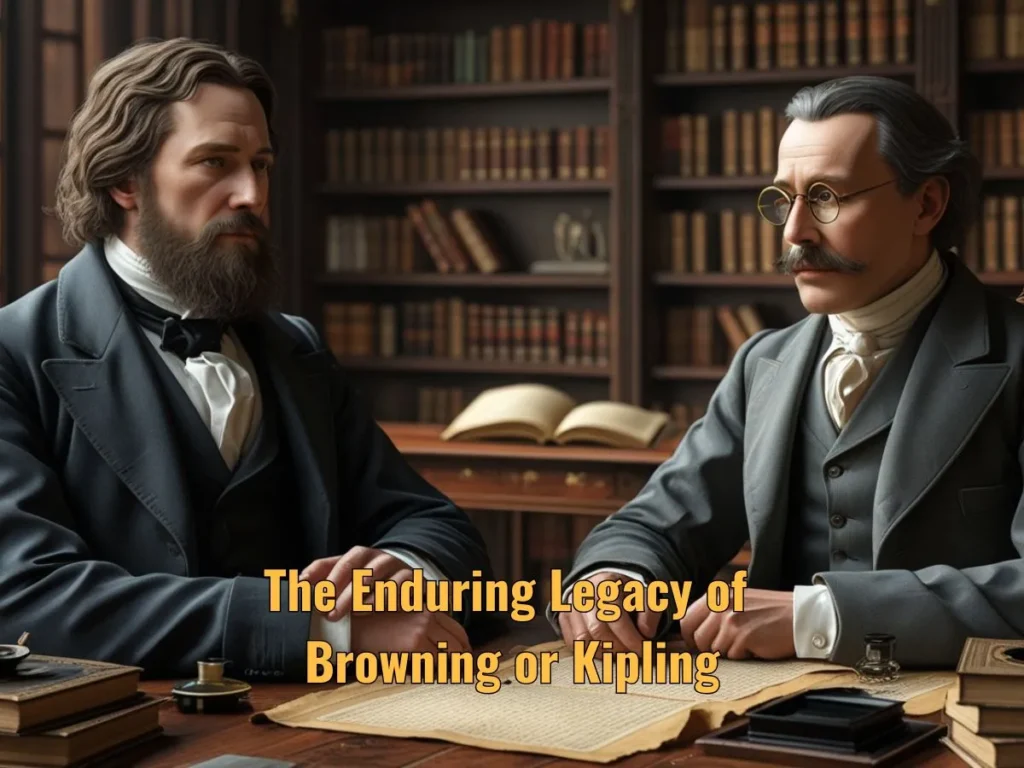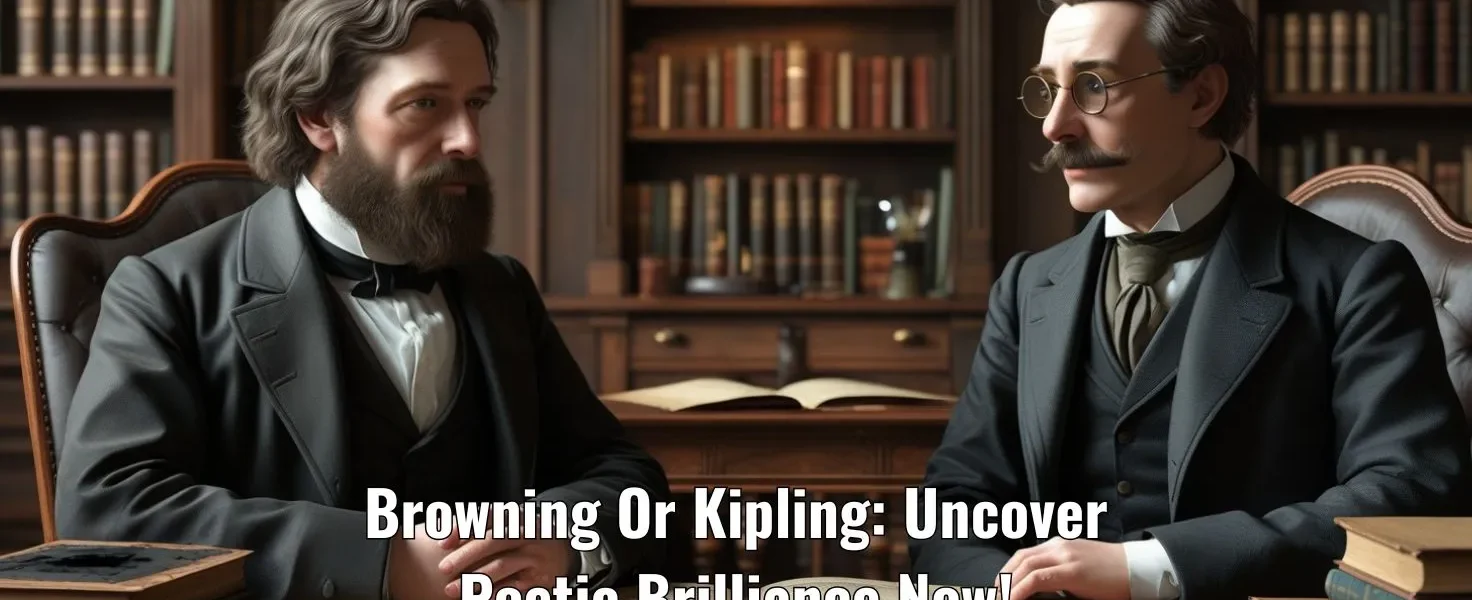I. Introduction
Are you struggling with today’s crossword, seeing the clue “Browning or Kipling” and drawing a blank? Many solvers face this.
This is the right answer for both Robert Browning and Rudyard Kipling. Although simply typing “POET” and being done with it would be to miss out on quite a story.
Outside the puzzle, a rich and intricate literary comparison beckons. Which of these two “poet powerhouses” left a greater legacy? How are their legacies intertwined, and how do they also diverge?
This essay moves beyond the direct crossword answer to compare and contrast Robert Browning and Rudyard Kipling. We will examine why they remain so powerful today.
II. The Literary Landscape: Setting the Stage for Browning or Kipling

To appreciate the original significance of their works for Browning or Kipling, knowledge of their historical context is essential. The Victorian era, which spanned most of the 19th century up to World War I, was a period of enormous transformation.
New industries reshaped society. New scientific findings contradicted long-held beliefs. Moreover, the British Empire expanded and ruled the world as a hegemon.
The literature also reflected these changes. It shifted from romanticism to realism and social sin. Poetry, in particular, became an outlet for processing deep thoughts and societal anxieties.
It was in this fertile medium that Browning and Kipling developed their own, individualized voices. They all brought a distinctive sensibility to bear on the intellectual and emotional currents of their time.
And yet, both (Showtime is the more successful of the two) were equally mesmerizing. Knowing this context enables us to understand their enduring influence better.
III. Robert Browning: Architect of the Inner World
Robert Browning (1812-1889) is a significant presence in the world of Victorian literature. He is famous for reinventing poetry and his profound understanding of the human psyche.
Browning was born in London and was largely self-taught, reading widely in the vast libraries available to him. His marriage to the poet Elizabeth Barrett Browning was one of literature’s most famous love stories.
And it’s an equation that can be found in many of the passionate human connections he wrote about. The dramatic monologue is what Browning does best. In this distinctive poetic form, one speaker (not the poet) addresses a silent listener.
The speaker’s rambling or self-justifying attempt to explain the meaning of his words inadvertently reveals his actual character and motivations.
This format allows for in-depth exploration of human thinking. It exposed moral dilemmas and human conflict with uncommon realism.
Browning’s themes are always lush and multifaceted. They focus on:
- Complexity of Psychology: He is not a simple character. Their motivations are often felt, rarely announced, the products of deep yearnings or secret needs, or intractable ethical problems. This concentration on the mind made him a pioneer of psychological poetry.
- Love and Relationships: Love of all kinds, from the obsessive to the spiritual, is a perennial subject.
- Faith and Doubt: Browning is renowned for his exploration of matters of faith and doubt. These were significant issues in the Victorian period, when science and society were undergoing rapid change.
- Art and Aesthetics: Some poems feature artists or their patrons. They consider how art is made, what beauty is, and how art relates to life.
IV. Rudyard Kipling: Voice of Empire and Human Nature
Rudyard Kipling (1865-1936), another Nobel laureate, achieved widespread fame in the second half of the Victorian era. His eventful career spanned the first decade of the 20th century.
Life Early Years Born in Bombay, British India, which was part of the British Empire at the time, Kipling was heavily influenced by his birthplace. It formed the rich backdrop for so much of his iconic writing.
Ironically, Kipling was to make a career writing about the strange and exotic in the world. And he would celebrate the spirit of empire, and sometimes also the harsh truths of human nature:
- Colonialism and Empire: Kipling was the quintessential poet of empire. Even as he painted an expansive canvas of the “civilizing mission,” his works, including “The White Man’s Burden,” also emphasized the enormous responsibilities and burdens of imperial rule. He recorded the lives of soldiers, officials, and a variety of local people. He conducted a nuanced analysis of colonialism and literature.
- Duty, Discipline, Law: Kevin’s work is marked throughout by a high degree of concern with individual or local duty, collective task, social duty, and adherence to some clear moral or natural “law”. His well-known poem “If” is an international emblem of quiet fortitude. It demonstrates his faith in moral vigor.
- The ‘Jungle Law’ and Civilization: In his best-loved classics, such as The Jungle Book, Kipling juxtaposed the immutable laws of nature against the imperfect, yet necessary, rules of human society. The wilderness was a metaphor for those universal truths.
- Early Years and Adventure: Despite his serious and mature themes, Kipling’s work was filled with humor, and he often used children as the main characters in his work. This is evident in his adventure tales, such as Kim and Captain Courageous.
V. Browning or Kipling: A Direct Comparison of Literary Giants
When we set Browning or Kipling beside him, their respective strengths stand out in sharp relief. They are very different, but they are also balanced by a hint of the same thing: emblems of their time. The distinction is simply what they factored in:
Focus of Exploration: Inner vs. Outer Worlds
- Browning: He gazed into the heart of darkness. What he was good at was cutting open the mind of a single person. He removed layers of motivational bricolage to expose the complex, often discordant, thoughts and feelings that people have. His characters were miniature versions of profound psychological truths.
- Kipling: He saw mostly out. His settings were large: empires, societies, and nature. He delved into how people function within large systems, including the army and colonial rule. He demonstrated how significant forces can direct a person’s life.
Dominant Form and Tone: Ambiguity vs. Authority
- Browning: He kept the dramatic monologue alive. This form was, of course, highly ambiguous. The speaker’s truth was never in the bag. This required the reader to do some work, and it was open to interpretation. His voice could be sardonic or unnerving. It often left questions open.
- Kipling: He was a master of narrative prose (short stories, novels) and rhythmic, storytelling verse. His voice tended to instruct as it recounted, teaching clear principles of morality. And while he depicted hard truths, his stories typically offered a guiding light. They applauded virtues such as duty and courage.
Relationship to the Reader: Interpreter vs. Guided Experience
- Browning: He insisted on active interpretation. The reader assumed the role of detective, decoding double meanings to ascertain the “truth” of the matter. Meaning was often co-created.
- Kipling: He led the reader so often. His tales were entertaining, but they often also contained a direct moral or point he hoped to make. The reader was encouraged to identify and sometimes sympathize with the lessons.
Shared Ground for Browning or Kipling
Notwithstanding these obvious differences in attitude between Browning and Kipling, there were aspects of the training they shared as writers:
- Interest in Human Nature: Both were student observers of people. Browning examined inner turmoil, and Kipling depicted human behavior under stress in various cultures.
- Masterful Storytelling: Both were great storytellers. The achievement of writing a complex tale in a handful of lines of a monologue. Kipling wrote grand adventures and touching short scenes.
- In Touch with Contemporary Society: Plath and Dickinson were acutely conscious of the social, political, and moral currents in their era. They placed these into their art.
In other words, Browning cut windows in the soul. Kipling offered broad perspectives on the world and its complex society. Neither is clearly “better.”
To be exceptional is to do one-of-a-kind things. It is really rewarding to read this in comparison to Browning vs. Kipling themes or Browning vs. Kipling style.
VI. The Enduring Legacy of Browning or Kipling

However, the very existence of a simple Browning or Kipling crossword clue, albeit rare, makes its way into a puzzle, showing that they endure in literature. Their writing is as accessible as it is mesmerizing. This cements their position as “poet powerhouses.”
Browning’s influence rests largely on his innovation in exploring poetic form and psychological realism. His dramatic monologues were a precursor to modern poetry’s emphasis on the individual voice.
They also shaped the stream of consciousness and the exploration of inner lives. And literary scholars continue to deconstruct the hidden depths of his characters and the philosophical questions his poems raise.
His impact extends to novelists and playwrights interested in uncovering secret motivations. Kipling’s legacy, of course, is contested in this new era, when colonialism is viewed through a different lens.
His excellent narrative abilities, beautifully described exotic locales, and exploration of universal themes (duty, sacrifice) keep him in place.
Some works, like The Jungle Book, continue to enchant new generations. “If” remains one of the best expressions of character yet committed to paper.
In the academy, Kipling is crucial to understanding imperial literature and national identity. There are golden veins for criticism in Browning and Kipling alike. They offer glimpses of their times, as well as timeless truths about human existence.
VII. Conclusion: Beyond the Clue, a World of Poetic Brilliance
From an easy Browning or Kipling clue in a daily crossword to a long, deep literary journey, these poets will open a world of brilliance for you.
Although “POET” is the obvious answer, their distinct contributions to English literature are plentiful. Where Robert Browning anatomizes the personal psyche, Rudyard Kipling displays global narratives of empire.
Both are genuine “poet powerhouses,” each with its perspective on the passing year. One’s not really “the winner” over the other’s verse, but rather both are separate geniuses that make literature ever the wealthier in terms of literary trails. Delve further into the treasure trove of these stars!
Frequently Asked Questions
What is the main difference between Browning and Kipling’s poetry?
If Browning used the dramatic monologue to delve into the psyche of the individual, Kipling took his narrative verse to elucidate the themes of the society and empire.
Why is “POET” the crossword answer for Browning or Kipling?
Both Robert Browning and Rudyard Kipling were celebrated poets, so “POET” was the short and sweet solution to the crossword clue.
Did Robert Browning and Rudyard Kipling know each other?
Alfred and Hesychius were contemporaries, but there are few if any specific references to either author by the other, and they moved in different literary circles and two generations apart.
Which major poetic form is Robert Browning known for?
The author It is as a master and innovator of the dramatic monologue that Robert Browning is best known.
What common theme connects Browning and Kipling’s works?
It was no wonder that both poets showed so powerful an interest in human nature, that both were such brilliant story-tellers−though after a different fashion.








